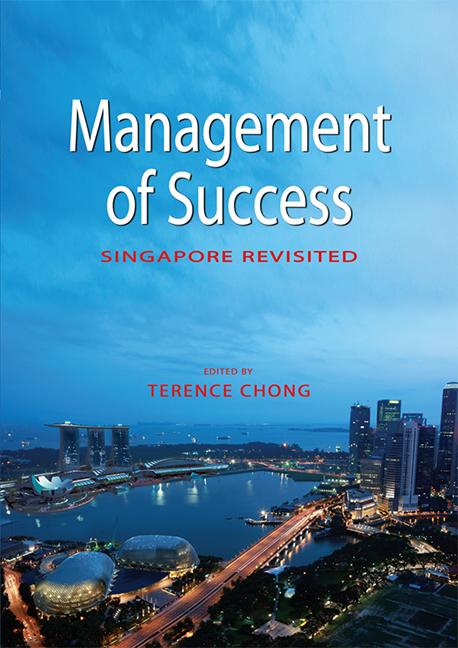Book contents
- Frontmatter
- Contents
- List of Tables and Figures
- Foreword
- Message
- Quote
- Preface
- The Contributors
- 1 Introduction: The Role of Success in Singapore's National Identity
- SECTION 1 SINGAPORE IN THE BIGGER PICTURE
- SECTION 2 LEADERSHIP, POLICY AND POLITICS
- SECTION 3 THE RESTRUCTURING OF THE ECONOMY
- SECTION 4 THE TRANSFORMATION OF SOCIETY
- SECTION 5 THE LAW
- SECTION 6 MODIFICATION OF THE ENVIRONMENT
- SECTION 7 COMMUNITY AND NATIONAL SECURITY
- SECTION 8 LIFE IN SINGAPORE
- 26 Culture, the Arts and the Global City
- 27 Fluid Nation: The Perpetual “Renovation” of Nation and National Identities in Singapore
- 28 Suffer the Rebellious Children: The Politics of Remaking Singapore and the Remaking of Singapore Politics
- 29 “It's Like Rice on the Table, It's Our Common Dish”: The English Language and Identity in Singapore
- 30 Multiculturalism and the Problem of Solidarity
- 31 Sexual Governance and the Politics of Sex in Singapore
- 32 Conclusion
- Index
31 - Sexual Governance and the Politics of Sex in Singapore
from SECTION 8 - LIFE IN SINGAPORE
Published online by Cambridge University Press: 21 October 2015
- Frontmatter
- Contents
- List of Tables and Figures
- Foreword
- Message
- Quote
- Preface
- The Contributors
- 1 Introduction: The Role of Success in Singapore's National Identity
- SECTION 1 SINGAPORE IN THE BIGGER PICTURE
- SECTION 2 LEADERSHIP, POLICY AND POLITICS
- SECTION 3 THE RESTRUCTURING OF THE ECONOMY
- SECTION 4 THE TRANSFORMATION OF SOCIETY
- SECTION 5 THE LAW
- SECTION 6 MODIFICATION OF THE ENVIRONMENT
- SECTION 7 COMMUNITY AND NATIONAL SECURITY
- SECTION 8 LIFE IN SINGAPORE
- 26 Culture, the Arts and the Global City
- 27 Fluid Nation: The Perpetual “Renovation” of Nation and National Identities in Singapore
- 28 Suffer the Rebellious Children: The Politics of Remaking Singapore and the Remaking of Singapore Politics
- 29 “It's Like Rice on the Table, It's Our Common Dish”: The English Language and Identity in Singapore
- 30 Multiculturalism and the Problem of Solidarity
- 31 Sexual Governance and the Politics of Sex in Singapore
- 32 Conclusion
- Index
Summary
THE POLITICS OF SEXUALITY IN SINGAPORE
In October 2007, Singapore International Airlines proudly inaugurated the double-decker super-jumbo Airbus A380. It made international news because it was the world's biggest commercial plane with a seating capacity of 471 passengers and 12 first class private suites containing double beds. But the size factor was not the only source of newsworthiness; a “no sex” rule for the first class cabin became the topic of media attention. A seventy-six-year-old Australian who flew with his wife aboard the suite complained that the mis-en-scène for sex was set up (the double bed, the champagne and the romantic ambience) but without the possibility of “doing what comes naturally”.
The acronym for Singapore International Airlines — SIA — could have stood for “Sex In the Air”, but sex on the airborne bed was ruled out. In asking airline passengers to refrain from sexual activities on board, the company official said it did not want to offend other travellers or crew. There was also an acknowledgement that the cabins were not completely private in spite of advertising sales pitch that invited passengers to “experience unprecedented levels of privacy”. The walls, in fact, did not reach up to the ceiling, and the suites were not soundproof. This SIA episode is illustrative of several broader issues about sexuality in Singapore. Firstly, the “no sex” rule appears to be in line with the international reputation of Singapore as a highly regimented society where the authorities zealously create rules to regulate the lives of people. No aspect of human activity, including sex, escapes the clutches of the state.
Secondly, the existence of rules signals prohibition rather than allowance, restriction rather than acceptance. The People's Action Party (PAP) government has often relied on the cultural argument of “Asian conservativism” to forestall any reforms in sexual laws that were originally instituted by the British. In reality, the “ban culture” that Singapore is infamous for is rooted not in Asian civilizational history, but in state intervention in the everyday lives of citizens.
- Type
- Chapter
- Information
- Management of SuccessSingapore Revisited, pp. 579 - 593Publisher: ISEAS–Yusof Ishak InstitutePrint publication year: 2010

